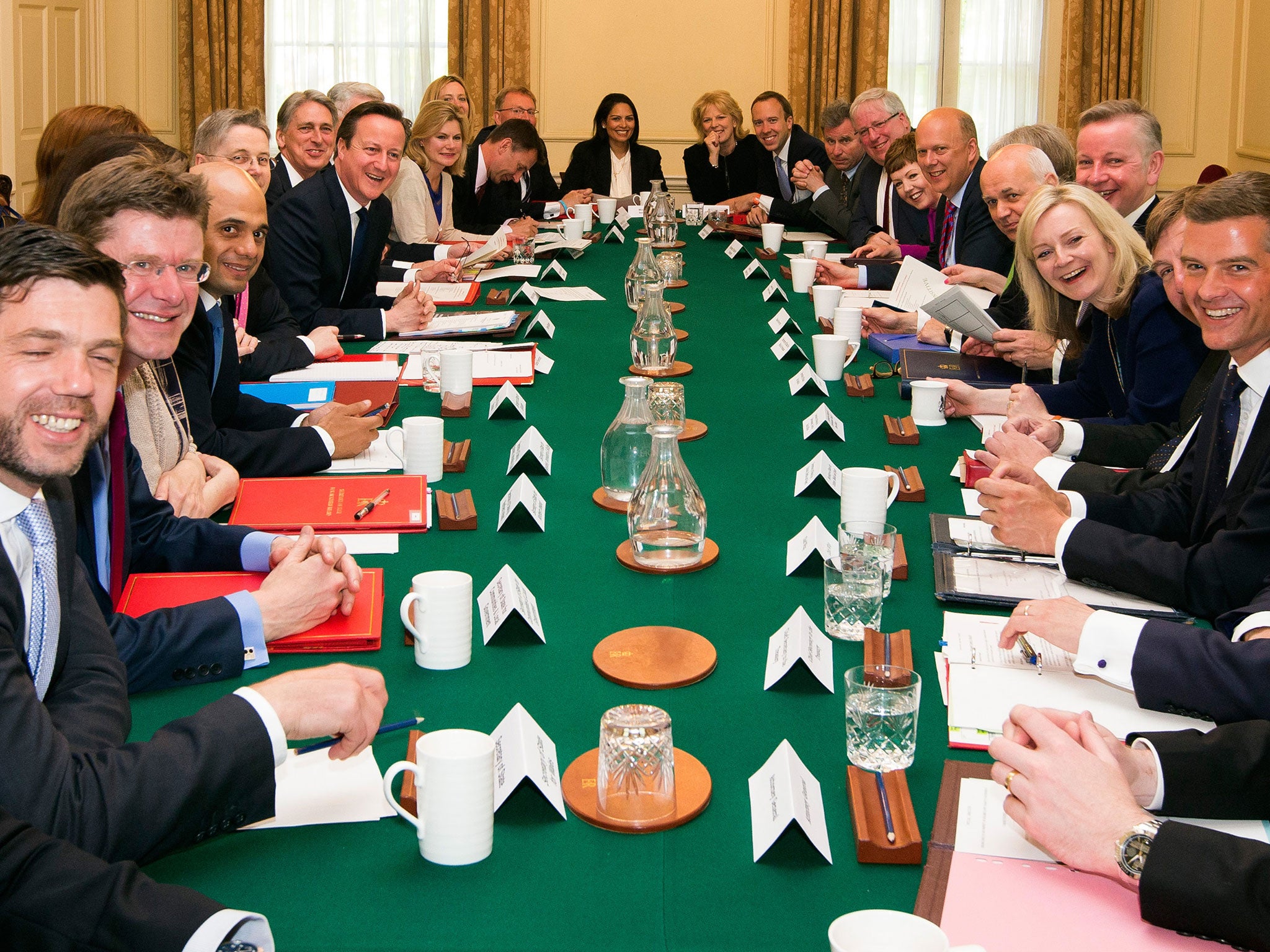David Cameron moves to unite Tory factions by putting his fiercest critics in Cabinet
A tiny majority of twelve leaves the PM vulnerable against backbenchers

David Cameron has acted to unite the Conservative Party’s different factions by handing jobs in his new Government to some of his fiercest critics.
His move was aimed at shoring up a tiny majority of 12, which has left the administration highly vulnerable to rebellion by disaffected Tory backbenchers.
The Prime Minister promoted Rory Stewart, a leading critic of the Government’s defence policy in the last government, to the post of junior environment minister. As chairman of the defence select committee, he led calls for Britain to commit itself to spending two per cent of gross national product on the military.
Dominic Raab, a key figure in a rebellion against plans for Britain to remain in the European Arrest Warrant system, was made a junior minister in the Ministry of Justice.
His fellow Eurosceptic Tracey Crouch, who developed a reputation as a rebel, was made sports minister.
The former army officer Ben Wallace, who turned down a whip’s job in 2012, was appointed as a junior minister at the Northern Ireland Office. Mr Cameron also brought back into government Alistair Burt, two years after sacking him as a Foreign Office minister. He was made a minister of state in the Department of Health.
His return was an admission he was wrong to fire the highly regarded MP and sends a message to older backbenchers that the door is always open to securing a government job.
One of the more significant appointments below Cabinet level was the decision to retain David Lidington in his job as Europe minister. He will now play a crucial role in negotiations with Brussels ahead of the Government’s promised referendum on EU membership by 2017.
He is viewed with suspicion - if not disdain - by Tory Eurosceptics, who unsuccessfully lobbied Mr Cameron to move him in the last Parliament.
But he is very highly regarded in Paris and Berlin, where he has developed strong contracts over past five years in the job, and by keeping him in post Mr Cameron is signalling that he intends to take a positive approach to the renegotiations. He has also left open the possibility of staging the referendum before 2017.
Mr Lidington will have the task of sounding out other European countries on Britain’s proposals for reform before they reach Brussels, and to attempt to build a consensus that is acceptable.
In particular he will have to go on a charm offensive to win round Eastern European countries to British proposals limiting the benefits to which migrant workers in the UK are entitled. This is currently being fiercely opposed by countries such as Poland and Hungary who could block any final deal.
But in a sign of the difficulties ahead, Wolfgang Schäuble, Germany’s finance minister, said other European partners would not be rushed into changing the bloc’s treaties to meet its British demands.
Speaking after discussing the Government’s ideas for reform with George Osborne on the margins of the EU finance ministers’ monthly meeting, Mr Schäuble said any reopening of treaties would not occur for some time.
“The opinion of the German government has always been that we need treaty changes, whenever, the sooner the better,” Mr Schäuble said.
“But the realistic assessment of the German government is that it is not at all certain that this can be achieved quickly.”
Speaking before the meeting Mr Osborne insisted the new Government had a very clear mandate for reform.
“I don’t think anyone’s now in any doubt that we will hold that referendum on Britain’s membership of the European Union having conducted these negotiations,” he said.
“We go into the negotiations aiming to be constructive and engaged, but also resolute and firm.
“And no one should underestimate our determination to succeed for the working people of Britain, indeed the working people of the whole of the European Union.”
The Prime Minister made his appointments as he addressed the first meeting of his new Tory-only Cabinet. He said the majority administration would be “different” from the Coalition as it would have proper accountability.
He told his ministers, who banged the table in congratulation as he arrived, that there would be no trading away of policies and the Conservatives would act as the “real party of working people”.
He began: “I want everyone round this table to be absolutely clear what we are here to do and who we are here to do it for.
“It is absolutely vital that every decision that we take, every policy we pursue, every programme we start is about giving everyone in our country the best chance of living a fulfilling and good life and making the most of their talents. That’s what this government is going to be about.”
Subscribe to Independent Premium to bookmark this article
Want to bookmark your favourite articles and stories to read or reference later? Start your Independent Premium subscription today.

Join our commenting forum
Join thought-provoking conversations, follow other Independent readers and see their replies